PTI convoys enter Islamabad amid violent clashes with police
A police constable died from severe injuries, and over 70 officers injured during violent clashes with PTI protesters
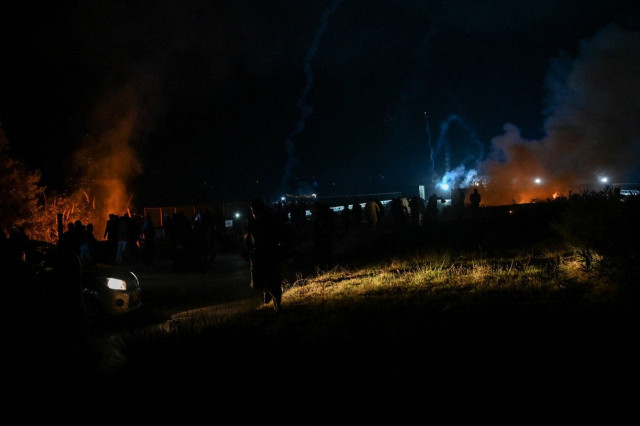
PTI convoys led by Khyber Pakhtunkhwa (K-P) Chief Minister Ali Amin Gandapur and Opposition Leader, Omar Ayub, entered Islamabad on the call of Pakistan Tehreek-e-Insaf founder Imran Khan.
The convoys, originating from the Hazara Interchange, are heading towards D-Chowk in Islamabad.
As the convoys advanced, they encountered heavy resistance from the police at the Ghazi Brotha Bridge, where intense shelling was reported.
Despite the police crackdown, Omar Ayub's convoy managed to push back Punjab Police forces at the Hazara Interchange. Ali Amin Gandapur, who is leading the Hazara Division convoy, played a crucial role in helping the convoy break through the police barricades.
After overcoming the police blockade, the convoys continued their journey, with vehicles stretching over two kilometers as they moved forward. On the Hazara Motorway, PTI supporters successfully forced police to retreat, with reports of violent clashes and heavy stone-pelting.
Several police personnel were injured in the scuffles, and two officers were severely wounded and transferred to hospitals.
Among the injured officers were DSPs Chaudhry Zulfiqar and Shahid Gilani, as well as ASI Tabassum. DSP Zulfiqar suffered significant injuries to his back and legs during the confrontation.
Police constable dies in clashes with PTI supporters
A police constable has died from severe injuries, and over 70 officers were injured during violent clashes with Pakistan Tehreek-e-Insaf (PTI) protesters in Islamabad.
Constable Mubashir, 46, succumbed to head injuries after PTI protesters allegedly attacked police personnel near Hakla. The injured officer was rushed to Tehsil Headquarters Hospital in Hassan Abdal, where he was later pronounced dead. Mubashir is survived by his wife, two daughters, and a son.
'Talks underway'
Barrister Gohar Khan and Saif held a 90-minute meeting with Pakistan Tehreek-e-Insaf (PTI) founder Imran Khan in Adiala Jail, Rawalpindi. Following the meeting, Barrister Gohar described the discussion as significant, confirming that Imran Khan’s call for a protest remains final and that rumors about it being canceled were untrue.
Speaking to journalists after the meeting, Barrister Gohar emphasised that the PTI founder’s stance on the protest was unchanged, and the movement would proceed as planned. The meeting focused on strategic discussions regarding the ongoing political situation and the party's future course of action.
When asked about the ongoing negotiations surrounding the protest, Barrister Gohar assured reporters that updates would be provided in due course. He further confirmed that discussions were still ongoing but did not offer further details at this time.
'Final call'
The PTI gave its final call for the protest to meet its four demands: release of all political prisoners, including Imran Khan, reversal of the 26th Constitutional Amendment, restoration of democracy and Constitution in the country and return of allegedly "stolen mandate".
The demands surfaced on November 13 after Imran had urged people via a post on X, formerly Twitter, to reach Islamabad and not to return until those were met. The PTI had said that its rallies would be converted into a sit-in in the federal capital and end only when the demands were met.
Since then, the Pakistan Muslim League-Nawaz (PML-N)-led government, backed by a recent order of the Islamabad High Court (IHC), has been stating that neither the protestors would be allowed to enter the capital nor any leniency would be shown to them this time around.
In anticipation of a possible head-on collision between the authorities and the protesters and in view of the visit by Belarus President Alexander Lukashenko, the government decided to place containers to block all the main arteries leading to Islamabad.
The blockade has brought the twin cities as well as several other cities in Punjab to a standstill. A surprising decision was the sudden beginning of the repair work on different motorways. Besides, the government also shut down the internet in several areas.
Internet services suspension
The interior ministry had already announced a day ago that WiFi and mobile internet services would be suspended in areas with "security concerns" but it would remain operational in the rest of the country. Nevertheless, internet tracking monitor Netblocks said WhatsApp backends were restricted in Pakistan.
The decision was part of the government's strategy to block communication ahead of the planned protests. Amid this, both sides remained steadfast, refusing to back down until achieving their objectives.
Before the march began, the federal and Punjab governments imposed Section 144 of the Criminal Procedure Code (CrPC)a legal measure enabling district administrations to ban public gatherings temporarily and denied PTI permission to hold the protest.
Nevertheless, PTI took to the streets, with Gandapur leading the march from the party's stronghold in Khyber-Pakhtunkhwa, joined by the provincial leadership, workers, supporters, and Imran Khan's wife, Bushra Bibi. Though the caravans had entered Punjab, they were unlikely to reach Islamabad by Sunday night.
In a brief address to workers in Swabi, Gandapur urged them to press forward and not retreat until Imran Khan's release, calling on protesters to use all their strength to clear the path to the federal capital.
No turning back without Imran Khan
As the PTI convoy reached the Punjab boundary, the police started shelling on them at the Attock Bridge, Chach interchange and Ghazi Barotha canal areas. Later, Gandapur directed the convoy to stop at Ghazi Maqam for a while, urging the workers to get ready, because there was a "battle ahead".
Meanwhile, it was reported that Imran Khan's wife, Bushra Bibi, also addressed the workers and asked them to quickly move ahead in their vehicles instead of walking along the march, stressing they would have to move fast and shouldn't come back without bringing Imran Khan back.
While the K-P saw the largest mobilisation of the participants, the rallies also set out from various parts of Punjab, Sindh, and Balochistan. In Punjab, opposition supporters marched from cities, including Lahore, Rawalpindi, Gujranwala, Sialkot, Mianwali, Kasur, Okara, and Vehari, among others.
Despite heavy police and Rangers' deployment, many PTI workers managed to breach barricades and evade restrictions, in an attempt to reach the capital. Throughout the day, the PTI workers and LEA officials kept clashing in different parts of Punjab.
Several leaders arrested
A media report suggested that several PTI leaders, including PTI's chief whip in the National Assembly Amir Dogar and Zain Qureshi were arrested from Multan. Reports attributed to the Punjab police spokesperson said that around 600 people had been arrested for violating Section 144 in Punjab.
Meanwhile, Interior Minister Mohsin Naqvi promised on Sunday to restrict protestors outside Islamabad. Naqvi took an aerial view of Islamabad, Rawalpindi and Attock to review security arrangements in the three cities. He expressed satisfaction with the arrangements.
Naqvi stated that necessary measures had been taken to ensure peace and public order in compliance with the IHC's order. He added that police and paramilitary Frontier Corps (FC) and Rangers were diligently performing their duties.
The government had taken all possible measures to protect the lives and property of the citizens and that strict action would be taken against "miscreants" in accordance with the law, the interior minister emphasised.


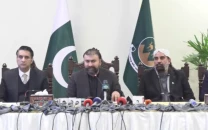
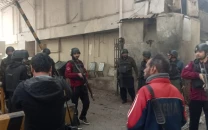
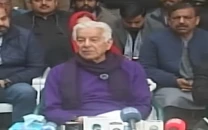

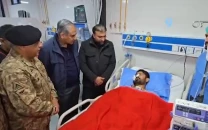












COMMENTS (1)
Comments are moderated and generally will be posted if they are on-topic and not abusive.
For more information, please see our Comments FAQ